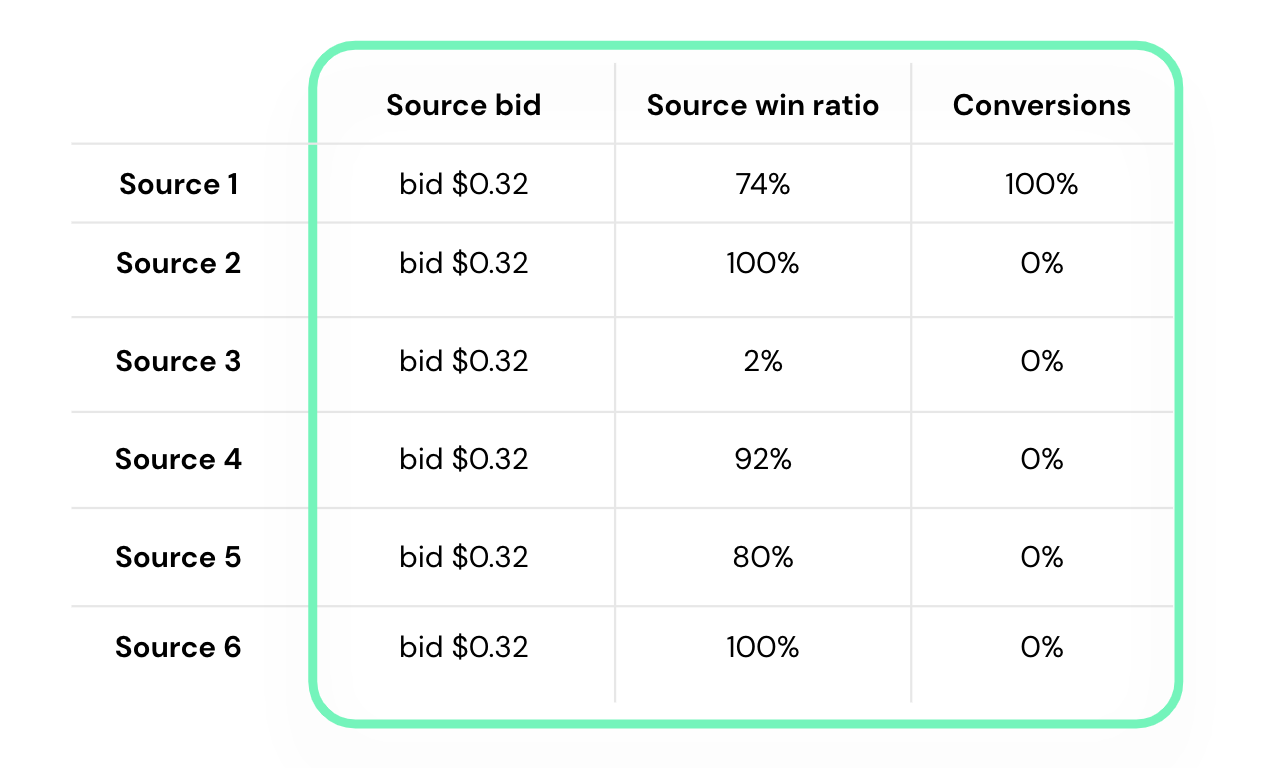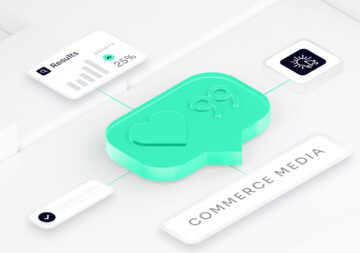Optimizing Search Marketplace campaigns in Zeropark may certainly seem like a challenging task, and it surely demands a high level of understanding of how the RTB platforms and ad-tech industry work.
If you’re already an experienced media buyer who wants to maximize the performance of your Zeropark Search Marketplace campaigns, then bear with us to learn everything there is to know about PPC bidding strategy, and why target-level bidding might be the key to success.
First, we’ll walk through the basics, then uncover some behind-the-scenes intel from the Zeropark Commerce Media platform, and hopefully, by the end of this article, you’ll be able to apply state-of-the-art bidding strategy to your campaigns.
About PPC and PPM
It’s not only important to learn what cost model the Zeropark Search Marketplace campaigns are based on, but it’s also crucial to understand what factors influence your campaign performance. The fluctuations and unpredicted situations will happen, so embracing the constant need to adjust your bid is the first step to unlocking the full potential of any campaign in performance marketing.
What is PPC bidding?
PPC (Pay-Per-Click) or CPC (Cost-Per-Click) is one of the most commonly used cost models in performance marketing. It indicates how much digital advertisers, affiliate marketers, and media buyers are willing to invest in a single click from the targeted user. In Zeropark, media buyers place desired bids that then should be adjusted on campaign, source, and target levels. All to navigate relevant audiences and best-performing placements.
PPC bidding in Zeropark
In Zeropark, we have built a dedicated bidding ecosystem to guarantee a just and reasonable performance for your commerce media campaigns. It’s been a long journey for our Product Operations Team who spent numerous iterations working on it, but one thing is for sure. The Zeropark bidding is based purely on data and not preferences or unfair arrangements, which even some mainstream advertising networks have been charged with.
The way it works in Zeropark is our platform takes the bids and puts them in the bidding session during a standard Real-Time Bidding (RTB) auction. It’s the fairest way for any advertiser’s bid to compete with others.
For Zeropark Search Marketplace campaigns, it is up to the advertiser whether they want to set their PPC on the source, target, or campaign level.
Budget options in Zeropark
When attending international shows, the Zeropark Team hears brand and agency representatives constantly expressing their concerns about spending on audiences that will not be valuable for the campaigns. To put it simply, global advertisers do not want to spend budgets on placements that do not provide conversions or raise brand awareness.
And as the optimization of campaigns is still the most reasonable of strategies for performance marketing, Zeropark has taken major steps by introducing a series of budget spend measures.
The Unlimited Budget,
First of all, advertisers in Zeropark can set a total budget for their campaign, and once that total budget is all spent, the campaign will stop competing for audiences. Having the budget set as “Unlimited” is yet the long-term variant that our Account Managers recommend for larger-scoped campaigns with more insights regarding targets and bids (such as publisher bid floors).

The Daily Budget
Daily budget capping allows you to spread the campaign’s daily spend over time. This secures budgets from being spent immediately in case the bid is too high and starts winning all the available audiences, which is not the optimal situation. Therefore, we highly recommend using this capping to limit daily spending on an entire campaign to better maneuver through sudden market changes and get reliable statistics from a prolonged time period.

The Target & Source daily budgets
Target and source daily budget capping is more than helpful on multiple occasions. Firstly, it limits overspending on a more granular level, allowing you to control the budget (for example when testing a new audience). Secondly, Commerce Media advertisers can, by using these, and with the additional use of target/source-level bids (more on that later), shift their focus to the most profitable placements.

Campaign vs target vs source: best PPC bidding strategy
There are countless factors influencing campaign performance, and the only thing that could be done by media buyers, affiliate marketers, and other advertisers is to react and adapt to the changing environment.
Nothing in performance marketing is really dogma. Everything changes based on the type of placement, type of offer, campaign targeting, and even competitors’ strategy. In short, different approaches and PPC bidding strategies will bear different outcomes in a changing environment. In general, it is recommended that advertisers of all kinds use the chance to set up more granular bids to have increased control over budget spending.
As shown in the Zeropark Media Planner Case Study, focusing on target or source-level bids should prove to boost the efficiency of your campaigns. Of course, it requires more data dwelling, but in the long run, should allow the campaigns to more efficiently consume the budgets.
Zeropark bidding algorithm
Now it’s time to talk a little about how things have been programmed in Zeropark. It’s a long story (10 years in the making), and we’ll need to make it as short as possible.
In general, the bidding system in Zeropark is based on multiple algorithms, that basically take a fair amount of factors and conditions into consideration, both on the supply and demand sides of the Commerce Media ecosystem.
It’s impressive to see there are people in the company who not only understand the complicated system in great detail but have also added to the creation of this complex structure. Even though we won’t be sharing all the details, as this article would easily turn into a book, the main takeaway is that the algorithmic bidding system in Zeropark has always been created in order to support fair campaign management.
Let’s say that your campaign bid was set for $0.50.
As a Media Buyer, it is only up to you to manage your bids to boost performance. Once you set the bid at $0.50, this amount (no more and no less) will be sent to Zeropark publishers whenever the RTB auction occurs. So, changing the bids should be your primary choice when trying to change the win ratio.
The best and most recommended way of doing that is to set source and target bids. This is because these allow you to have full control over performance. With metrics and data that go as deep as the target level, it will be simply more efficient to adjust the bids on target and source levels. This way, media buyers are able to steer the performance based on placements’ efficiency, without overpaying or underpaying for audiences.
If you are not able to perform the bid optimization on your side, please consult with your Account Manager for insights and tips. Our teams will be able to give your suggestions on potential performance and bid floors tailored to the needs of every Commerce Media campaign.
Account Manager advice: Campaign-level bids for Search Marketplace campaigns are a good solution for the early stages after the campaign launch. Such data gives you insights into performance on offered sources. But for optimization purposes, we recommend setting custom bids on the source and target levels for better prioritization.
Due to the complexity of algorithms, every source and campaign should be analyzed on a case-by-case basis. It has even occurred for some Search Marketplace campaigns that campaign-level bids performed slightly better than source-level bids, and it should not be alarming.
Case study

Case study details:
- Zeropark partner launched a Commerce Media (Search Marketplace) campaign for a major worldwide brand offering denim products. The brand is widely recognized and operates in a highly competitive industry. Apparel brand performance is one of the ones most heavily influenced by seasonality and customer preferences.
- In the Media Planner feature, the said partner finds out that the average PPC is $0.3113 for the brand. They speak to the Zeropark Account Manager who then suggests further steps.
- After consultations with the Account Manager, our partner creates a campaign with a bid of $0.32 that should allow them to tap into appx. 80% of audiences that are available for the brand. They also set a daily budget cap at $40 to get comprehensive data on sources without overspending. The bid is set for the entire campaign.
- After a couple of days, our partner discovers that their campaign managed to win 79% of available audiences, but different sources within the campaign performed differently:

Having invested his testing budget, the Zeropark partner noticed satisfactory overall performance: 79% win rate and 2.4x Return On Ad Spend. High ROAS is a result of the high Average Order Value of the recognized brand’s offer (the products could be considered as expensive). - Our partner consulted with Account Manager and they decided to raise competitiveness on the profitable source by raising the bid and daily budget cap. They also decided to stop bidding for underperforming sources.
- Our partner paused their campaign for all the sources besides Source 1. To optimize further, our partner and the Zeropark Account Manager went on to analyze the targets within the source. Thanks to the testing period, they already have some insights into the target-level performance. To avoid spending budgets on the ones that brought no conversions, but still bear some potential, the source-level bid has been set to $0.2. To ensure smooth audience buying, changes have been made to best-performing targets. This way, our partner has cut down targets that were not that valuable for their campaign while optimizing the bid for targets that bring profit.
- Further tests confirmed the said media buyers’ observations. The chosen top 3 targets with improved bids won more audiences, and the scale was visible due to raising the overall campaign budgets. After optimization, our media buying partner won 77% of the available audiences. More was expected here, but the competitor’s actions interfered. Ultimately, they raised the ROAS to 3.6x and managed to scale their Search Marketplace campaigns in a controlled environment.
Magdalena Bober





